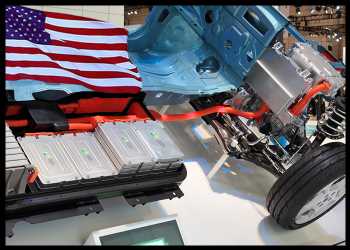President Joe Biden has announced the first set of projects funded by the Bipartisan Infrastructure Law to expand domestic manufacturing of batteries for electric vehicles (EVs) and the electrical grid and for materials and components currently imported from other countries.
Biden also launched an “American Battery Materials Initiative” to strengthen critical mineral supply chains.
20 companies will receive from the Department of Energy a combined $2.8 billion to build and expand commercial-scale facilities in 12 states to extract and process lithium, graphite and other battery materials, and manufacture components.
The companies’ manufacturing facilities will be situated in Alabama, Georgia, Kentucky, Louisiana, Missouri, Nevada, New York, North Carolina, North Dakota, Ohio, Tennessee, and Washington.
The Federal investment will be matched by recipients to leverage a total of more than $9 billion to boost American production of clean energy technology and create good-paying jobs.
“This is truly a remarkable time for manufacturing in America, as President Biden’s Agenda and historic investments supercharge the private sector to ensure our clean energy future is American-made,” said U.S. Secretary of Energy Jennifer M. Granholm. “Producing advanced batteries and components here at home will accelerate the transition away from fossil fuels to meet the strong demand for electric vehicles, creating more good-paying jobs across the country,” she added.
The funding for the selected projects will support developing enough battery-grade lithium to supply approximately 2 million EVs annually, enough battery-grade graphite to supply approximately 1.2 million EVs annually, producing enough battery-grade nickel to supply approximately 400,000 EVs annually, installing the first large-scale, and commercial lithium electrolyte salt (LiPF6) production facility in the United States.
It will also support, developing an electrode binder facility, creating the first commercial scale domestic silicon oxide production facilities to supply anode materials for an estimated 600,000 EV batteries annually, and installing the first lithium iron phosphate cathode facility in the United States.
All projects will develop enough lithium to supply more than 2 million electric vehicles annually and establish significant domestic production of graphite and nickel.
President Biden has set an ambitious goal to manufacture half of all new electric vehicles sold in the United States by 2030 and to transition to a net-zero emissions economy by 2050. EV sales have tripled since he took office, according to the White House. This market transformation is expected to increase demand for critical minerals such as lithium and graphite used in EV batteries.
Although plug-in EV sales have tripled since Biden took office, the U.S. depends on foreign sources for many of the processed versions of critical minerals needed to produce EV batteries.
Source: Read Full Article
-
Donald Trump Mugshot: See Booking Photo After Former President’s Arrest In Georgia
-
Asian Markets Mostly Lower Amid Cautious Trades
-
WGA Picketers Target ‘American Horror Story’ At Silvercup Studios As Ryan Murphy Threatens Litigation Against Strike Captain
-
Victoria Alonso Departs Marvel Studios After Nearly Two-Decade Run
-
Global aviation leasing body downgrades India in light of Go First case

